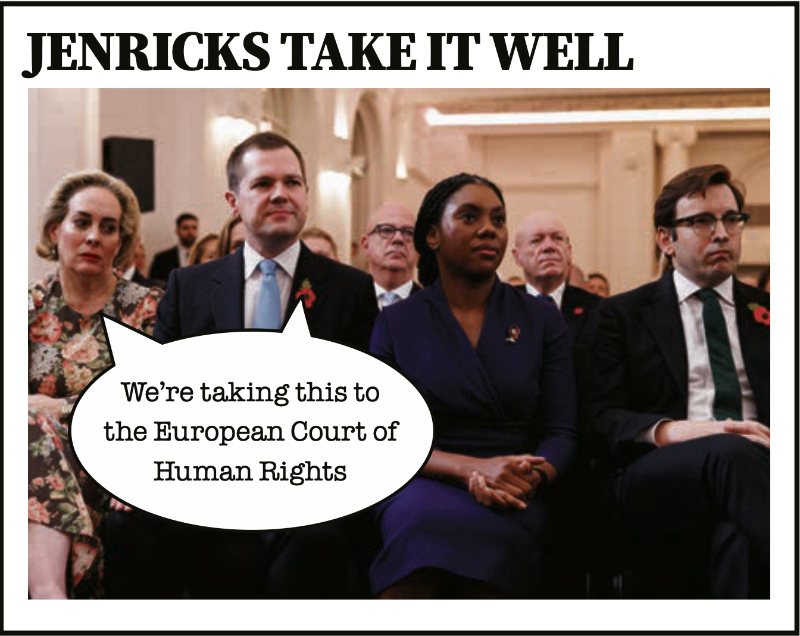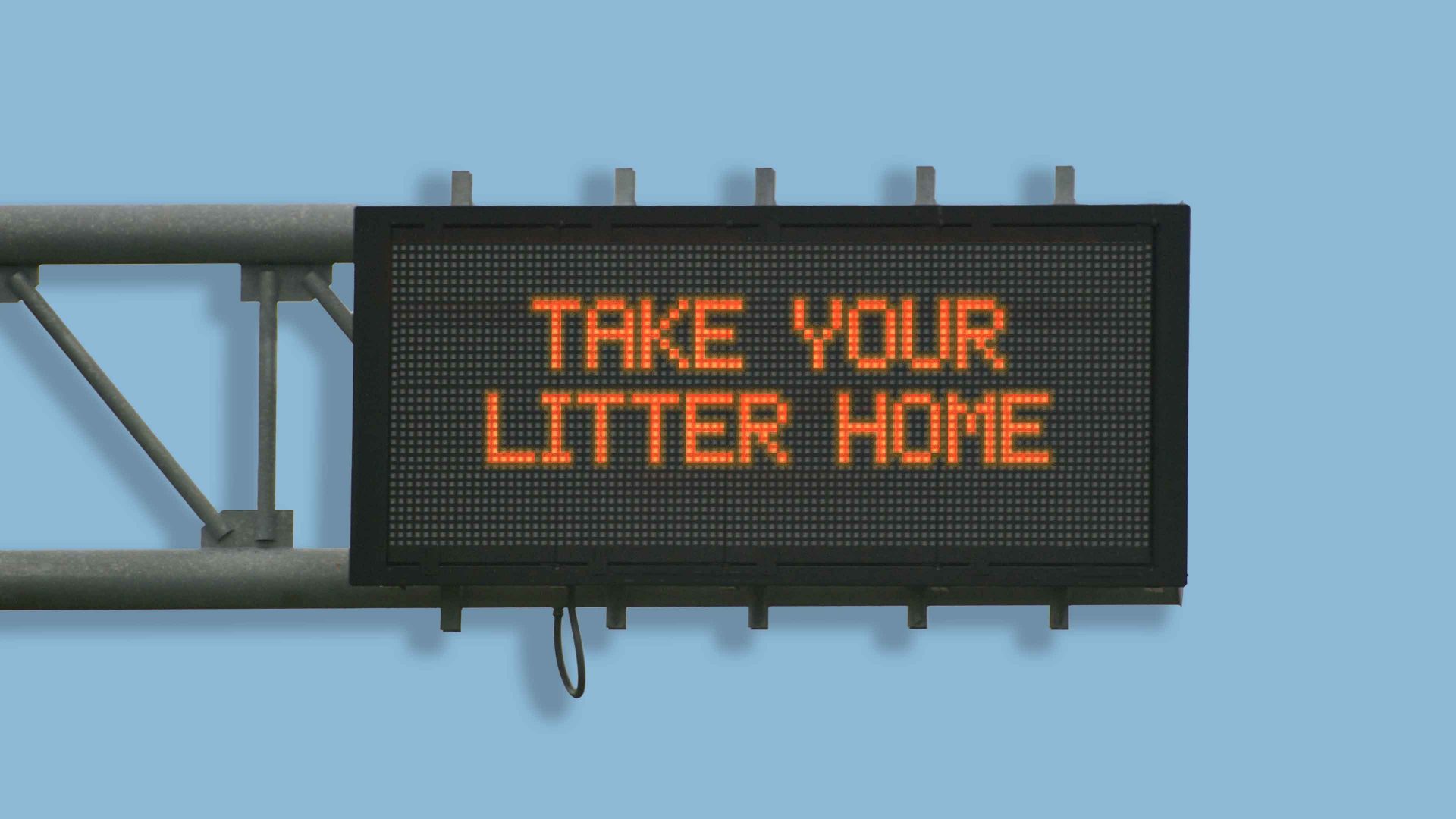It was uplifting to see Alastair Campbell’s piece about littering in the UK (Diary, TNE #410). This is a subject rarely raised by people with influence.
The UK’s litter problem has got worse over the last two decades.
There has always been litter in our towns and cities, but in my opinion, the big change in the last two decades has been the massive increase along our roadsides. The only places that seem to be spared are local and national beauty spots.
I have driven a lot across northern Europe in the last few years and, like Alastair, have noticed the lack of litter along French, Dutch, German and Italian roads.
I feel embarrassed by the shocking amount of litter on our roads. I do not know whether the problem in the UK is that more people drop litter or whether it is the lack of action by public authorities to remove it. I imagine it is a combination of the two.
Feargal Sharkey has shown what can be achieved when someone with a national voice shouts loud. What we need is for a household name to champion the fight against litter in the same way.
The only way to eradicate littering is to take a zero-tolerance approach and have it removed straight away, combined with public information campaigns educating people about the economic and environmental cost of removing litter. It is hard to imagine that happening, given the state of public finances bequeathed to us by the last government.
But there are simple, quick wins staring us in the face. Many motorways and A-roads have digital information boards for motorists and quite often these stand idle.
Why not have “Take your litter home” messages on those boards as default? It might make people think twice before throwing litter out of their car window.
Colin Lovegrove
Teddington, Greater London
I could not agree more with Alastair Campbell. Our roadsides are filthy with everything imaginable – some items too gross to mention, dirty nappies, food containers and general unhygienic litter, truly disgusting.
Locally we are lucky to have a merry band of a few hardy souls who voluntarily clean up litter and the difference is amazing.
Of course it doesn’t last long, the litterbugs are back in no time. I just can’t understand why they do it.
Deb Scott
I regularly litter-pick 22 lay-bys and sections of carriageway on the A38 and A419 in Gloucestershire. I have recovered more than 50,000 items so far this year. On Tuesday I weighed in 4,000 aluminium cans, taking me to approximately 73,000 since I started keeping records in April 2021. British streets, roads, and verges are the pits.
I’ve also picked up 94,000 items from other settings, including in and around businesses, which are supposed to keep their premises free of litter under existing legislation. They don’t, and litter authorities don’t enforce, thereby reinforcing litter acceptance.
Eric Torrington
Near our house is a local park, replete with bins, and while I was on a dog walk a year or so ago it was illuminating for me to observe a family walking nearby, with their children eating something with a wrapper.
One of the small children threw their wrapper on to the floor literally two feet away from a bin. The parent politely asked the child to pick it up and put it in the bin. The ensuing rumpus had to be seen to be believed, as the child refused point blank to do what they were asked to do. It took about five minutes, with all manner of (kindly but firm) entreaties from the parent, before the child did as asked and (very reluctantly) put the litter in the bin.
The moral of the tale? From an early age there seems to be an inbuilt human resistance (in the UK, if not France, Alastair) to put litter in the bin. Are any psychologists reading this able to offer an explanation and a means of altering this hard-wired behaviour?
Robert Parker
West Bridgford, Notts
Alastair Campbell is spot on about the scourge of litter in the UK. It is bad for visual amenity and for mental wellbeing; whether it be casual thoughtlessness, or inadequate packaging the day before refuse collection or, as I think Jeremy Paxman has mentioned, the collective madness of dog mess picked up but then hung in bags on trees like nightmarish Christmas decorations.
What to do? Civic/community self-help of course, and perhaps a bit more heft on enforcement. I had always hoped for a better and cheap anti-litter campaign: sadly “Litter Ye Not” (after Frankie Howerd’s catchphrase) would no longer resonate. Possibly peer pressure by calling people out – when judged safe to do so – might be best, alongside setting a good personal example.
Larry Stone
In September, we drove over two days from Quimper in Brittany to Derby via the Channel Tunnel. What a scruffy country we live in! Such a marked contrast to France.
It’s not just litter, though. Vegetation covering road signs, either that or they are green with lichen. Weeds growing at road edges…
Kerry Schofield
I wish I could remember who coined the word “bindow”, which is the use of the car window as a bin by throwing rubbish through it, in effect turning it into a bin. A case of out of car, out of mind.
David Pollard

Against the flow
Re: Your Feargal Sharkey-edited issue (TNE #410). Thank you Feargal, possibly a bigger star now than ever.
I am 75. Our rivers were once also vital trade routes. I grew up in a hamlet on the Welsh border with the little River Morda passing our house. We played by it and in it as children and loved it. It’s full of crap now.
I fear for my grandchildren, but commend you for all that you do.
Irene Wrench
Feargal Sharkey proves what an effective campaigner he is. A government with more courage than the present one would nationalise the water companies.
We need to sort our core public services, which have been privatised and asset-stripped over decades. Water is one of the most urgent.
David Rolfe
Thank you, Feargal, for your campaigning. Make it simple, make it hurt where it needs to. And look for friends and allies beyond your Labour Party homeland. It will take us all to make this OK, never mind better.
Steve McCann
While there is no denying the poor ecological health of many or most UK rivers, a historical perspective is needed so that present and future efforts to improve water quality can be focused on reducing the pollutants that are most damaging to humans and wildlife.
Through its network of hydrometric and water quality sampling stations, the UK has done pretty well at monitoring river water quality over several decades, and the data is publicly available via the National River Flow Archive and the Environment Agency’s Water Information Management System.
Establishing temporal trends in overall water quality is a complex issue because levels of individual pollutants are influenced by multiple factors that vary geographically and through time. Urbanisation, agricultural practices and water treatment are part of that story, as is stronger regulation, notably the EU’s Water Framework Directive and Urban Wastewater Treatment Directive. Broadly, however, the data suggests that levels of pollutants in UK rivers are similar to those around the time of privatisation, depending on the pollutant and where it is being measured.
Critically in this case, if you don’t measure it, you can’t improve it. Financial pressures on the Environment Agency have led to cuts in monitoring in recent years; disturbingly, for microbial pathogens, markers of faecal contamination and a key issue for human health, there is very little historical data.
While issues of river water quality are not new, the recent revival of cold-water swimming, along with citizen science generally, have brought them into focus. Climate change is increasing the chances of more extreme dry and wet-weather events that affect water quality in both positive and negative ways, often poorly quantified.
To use our resources to greatest effect, enhanced monitoring by the Environment Agency is needed to underpin enforced regulation, independent of whether the UK persists with a privatised water industry.
This, of course, requires funding, at a time when the purse strings are tight.
Andrew Aplin
Newcastle upon Tyne, Tyne and Wear
TNE has persisted in exposing serious issues facing this country. Two of the most immediate ones, water pollution and the housing shortage, are intimately connected.
This reminds me of the traditional song There’s a Hole in My Bucket where you can’t solve the first problem without attending to another one, and so it goes on in a vicious circle.
In all the noise about building 1.5 million houses in a hurry, I have not heard from Labour that fixing the water crisis has to come first. Meanwhile, we hear of villages that protest against new housing estates because they know that the local water company won’t be able to cope. I have read that Labour’s Steve Reed has vowed to fix the issues: good luck with that!
Otherwise we may have to accept that our rivers and beaches will be polluted for ever and that only the rich, who holiday abroad, will be able to swim in the sea; our British birthright, which I enjoyed as a child and shared with my children.
These two issues, of course, go back to Margaret Thatcher, who privatised the water companies against Labour protests, and who sold off council housing to buy votes and reduce the risk of strikes. One family’s right to buy makes at least one other family homeless.
J Yates
Enfield, Middlesex
TS Eliot agonised over the rhythms of his poetry. The distorted rhythm of the lines Simon Barnes quotes in “We are what we drink” (TNE #410) is a clue that they are wrong – The Waste Land actually says “Consider Phlebas, who was once handsome and tall as you.”
Dorothy Woolley
Newark on Trent, Notts
TNE’s missing link
I have subscribed to the New European since the very first issue on principle, though of course it’s an excellent magazine, and the colour printing is glorious.
Since Philip Ball arrived I’m even more committed. Thank you TNE for adding the one ingredient needed towards a robust balance – a science correspondent. At last! In fact a well-known eminent science writer, prolific author and brilliant speaker, particularly on cutting-edge biology.
Valerie Jeffries
Faversham, Kent
Culture war called off
I wonder if any of your other readers have noticed how quiet it has become on the culture war front since the change of government. Long may it last!
Ann Jones
Penarth, Vale of Glamorgan
Editor’s note: This letter arrived before the election of Kemi Badenoch as Conservative leader…

BELOW THE LINE
Comments, conversation and correspondence from our online subscribers
Re: Josh Barrie on Vichy Catalan water (TNE #410). Malvern Water actually ceased commercial production many years ago. I have hung on to two of the last bottles, which I may one day donate to a museum. At one time, Schweppes’s Malvern Water was an icon of Britishness, drunk by the Queen.
When in 2010 Schweppes decided to pull out because it was not profitable enough, a local firm attempted to market the water from an alternative source (the Holy Well), but failed to make a go of it. For almost 14 years now it has languished in relative obscurity. A metaphor for Britain itself perhaps.
Malvern water was notable for its exceptional purity. In the words of the well known rhyme “The Malvern Water, says Dr John Wall, is famed for containing just nothing at all.” Shame that you can’t say the same about much of the rest of Britain’s water.
Dr John King
“Beauty in a flow of words”, Charlie Connelly’s piece on books about rivers (TNE #410) was a lovely (and yes, flowing) article.
William Grogan
Re: Patience Wheatcroft on prisons (TNE #410). If it were agreed that only long-term offenders were imprisoned, and that tagging and probation officers were increased, it would make prison easier to manage, more cost-effective, and encourage those serving a sentence to develop skills, again reducing the chances of reoffending.
David Nelson
In “Snacks and snails on le menu” (TNE #409), Isabella Redmayne discusses comparative obesity in British and French adults and puts the latter’s better results down to a better quality of produce and a deeper connection with the food they eat. I have spent the last two summers in Brittany. I can assure you I saw just as many fat people as in the UK. Was the food much better? Not a lot. Britain has come a long way in raising the standard of our food.
Victoria Norwood
Re: Tanit Koch on Thomas Tuchel (TNE #409). Please don’t use the term “British media” when you really mean English. The Scottish media does not care who becomes England manager.
Lesley McCulloch
JOIN THE CONVERSATION
Subscribe and download our free new app to comment and chat with our writers



